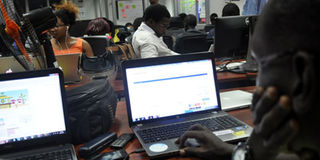Students must be trained for 21st Century ICT jobs

Students and teachers must be equipped with knowledge on Information Communication and Technology skills to be able to fit in the 21st Century work environment. File Photo
What you need to know:
The 21st Century working environment calls for diversity, entrepreneurship and skills that will make a child survive in the job market.
With the growing trend of advanced technology in the world today, the idea of having a holistic child groomed for competitiveness in the job market is ideal. This means that teachers also need to modify their teaching approach to realize such a product.
Teddy Nassiwa Ddamulira, the head teacher St Maria Goretti SS, Katende, says producing learners who are inquisitive, technologically advanced calls for change in the way teachers deliver information to these students. She suggests using the transformative method of teaching that helps a learner to be active, creative and a problem solver.
She was addressing participants during the careers stakeholders’ review workshop that was organised by BRAC through the Mastercard Foundation Scholars Programme in Kampala last week.
Ddamulira adds that today’s children need a lot of guidance and teachers at all levels should devise means of making children dialogue right from class so that they will be able to interact and compete no matter where they are.
“Organise a talk show, let the children express themselves, put out points and criticise and this participation will make them recall what they learnt easily,” she says.
Harriet Bampere Obbo, a human resource and organisational development consultant, revealed that as teachers work hard to prepare students for 21st Century careers, there is need to study the child as well as their needs.
“If you are designing a product, you must know who the consumers or clients are. In the same way, teachers need to learn and understand what the students’ interests are, what is informing their decision (know their environment), and understand what works for them as individuals and as students,” says Obbo.
Given the fact that most implementers (teachers) are from a different generation (X), there is need to adjust and design products that suit the current generation, according to Obbo.
“The current job market is so competitive as compared to decades ago and the working environment too has changed with the rapid pace of technology as well as outsourcing. so, if we are preparing a child to face that kind of market, it will be easier for them,” she says.
Look beyond salaries
Obbo argues that people should not only be doing a jobs to earn salary but look at career as something that brings psychological reward. This is why parents should guide their children to choose things they are passionate about.
He adds that the current job market calls for a lot of soft and social skills for one to cope with many aspects including pressure at the workplace such as being innovative, resilient, open minded, patient, flexible, and adaptive, among others.
But we cannot look at getting such a student when we still consider high grades the epitome of one’s education. It is because of this that Maureen Tweyongyere, the director school of Career and Skills Centre at Makerere University Business School urged teachers to allow children to diversify in other abilities.
“Sitting in class and excelling at academics is not enough. if children are to compete globally they need to engage in other activities so as to build their abilities both mentally and socially,” says Tweyongyere.
At the end of the day, the consensus is that it is time for teachers to embrace the change and walk the talk otherwise they will keep filling old wine in new bottles.




